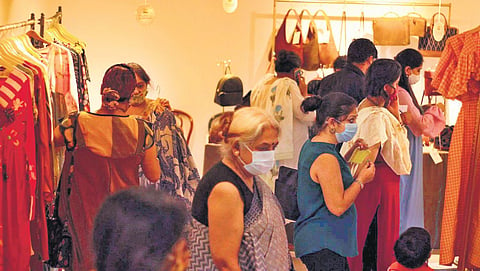

As far as timelines are concerned, it has been close to two years since the onset of the Coronavirus pandemic. Even though restrictions are easing in a phased manner, most businesses are still reeling from the effects of the pandemic. While some industries could manage embracing a digital model, the vast majority were unable to make that transition.
An order from the Delhi Disaster Management Authority (DDMA) this Wednesday stated that fairs and exhibitions in the city will be allowed starting the following day. This has brought much-needed relief to the business-to-consumer (B2C) exhibition industry, one that relies immensely on in-person sales.
Too little, too late
Nikita Arya (35), started the Fairytale’ss — Fashion & Lifestyle Exhibition as a small fair in Delhi in 2014. Over the years, Arya has managed to conduct multiple editions across Delhi, Lucknow and Dubai. For Arya, the pandemic proved to be a real body blow as far as business is concerned. She went from conducting 15 annual exhibitions in Delhi to an empty calendar for the past 18 months.
Talking about how the relaxations for most industries except hers affected Arya, she says, “I was heartbroken, since even the weekly markets, business-to-business exhibitions, and malls were given permission to open. Everyone knows that weekly markets are overcrowded. We [B2C exhibitions] mostly have serious buyers, and we still didn’t get permission. Also, now is not a lucrative time for sales until Navratri. I was disappointed it took so long.”
In the same vein, 31-year-old Dhruv Gurwara, feels that exhibitors almost felt singled out. Gurwara, who is the Creative Director of Bridal Asia — one of India’s largest wedding exhibitions — with malls, night markets, and even markets like Sarojini [Sarojini Nagar market] open, strict enforcement of regulations would have been impossible. Mentioning that he has no complaints, he says, “At the end of the day, it is a matter of health and safety. In the times we live in, we just have to move forward.” Gurwara, who conducted an edition of Bridal Asia in March 2021 in the city, will have another on October 9 and 10.
He elaborates that the team has strict COVID protocols in place. Be it proper sanitisation of stalls and venue, strict mask wearing rules, checking the Aarogya Setu app, double vaccination certificate, and an RT-PCR test within the last 48-hour before visiting the venue for customers who are non- or single-vaccinated, among others, Gurwara has a checklist to maintain.
In a tight spot
With businesses just getting back on their feet, the added costs of COVID protocols may just be difficult for many to take on. Gurgaon-based Devyani Kapoor (30) is the founder of Shuffling Suitcases (SS), a slow fashion community that also conducts events. While Kapoor hasn’t done a pop-up in Delhi for a while, she has been hosting events in Hyderabad and Kolkata amid the pandemic. Today, as she hosts an edition of SS in Bengaluru, she mentions the challenges of hosting such events, “We had to change the model a lot; bargain with venues.
Many brands are not comfortable travelling, so we are selling their goods for them.” Kapoor also talks about added costs, saying, “We conduct fumigation and sanitisation after setting up. We will ensure no entry without masks and will have sanitisers handy.” Low footfall, high costs, and limited interaction with vendors are a few other challenges, says Sadhana Talwar Mehta (39), who last conducted her pop-up named The Wish List at Delhi’s Taj Mahal Hotel in August 2019.
While Mehta, who is currently in Singapore, says that it’s a welcome move by the government, she is certain that many organisers will find the costs prohibitive. “It is good that businesses are re-starting. But, rentals will be high; so will set-up and associated costs. What’s important is to support the handloom industry through exhibitions right now. They [the artisans] have been overlooked and need to be given a platform.